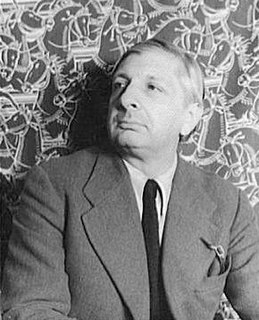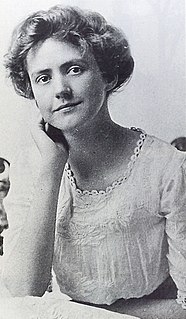A Quote by Ernest Holmes
Each one should realize there is nothing in (us) which denies that which (we) desire.
Related Quotes
The word desire suggests that there is something we do not have. If we have everything already, then there can be no desire, for there is nothing left to want. I think that what the Buddha may have been trying to tell us is that we have it all, each of us, all the time; therefore, desire is simply unnecessary.
The first peace, which is the most important,
is that which comes within the souls of people
when they realize their relationship,
their oneness with the universe and all its powers,
and when they realize that at the center of the universe
dwells the Great Spirit,
and that this center is really everywhere,
it is within each of us.
It is essential that the revelation we receive, the conception of an image which embraces a certain thing, which has no sense in itself, which has no subject, which means 'absolutely nothing' from the logical point of view.. ..should speak so strongly in us, evoke such agony or joy, that we feel compelled to paint.
Spend your time in nothing which you know must be repented of; in nothing on which you might not pray for the blessing of God; in nothing which you could not review with a quiet conscience on your dying bed; in nothing which you might not safely and properly be found doing if death should surprise you in the act.
Strong, deeply rooted desire is the starting point of all achievement. Just as the electron is the last unit of matter discernible to the scientist. DESIRE is the seed of all achievement; the starting place, back of which there is nothing, or at least there is nothing of which we have any knowledge.
Nothing which is at all times and in every way agreeable to us can have objective reality. It is of the very nature of the real that it should have sharp corners and rough edges, that it should be resistant, should be itself. Dream-furniture is the only kind on which you never stub your toes or bang your knee.
The ways of change are dictated by the circumstances of each country, each place and each time. I don't think that arrogant intellectuals should be dictating to the people which way they should be heading. I think we should be listening to the people, see in which directions things are developing. People are walking where they can, not where they want to. But they are walking!
What ever the course of our lives, we should recieve them as the highest gift from the hand of God, in which equally reposed the power to do nothing whatever for us. Indeed, we should accept misfortune not only in thanks, but in infinite gratitude to Providence, which by such means detaches us from an excessive love for Earthly things and elevates our minds to the celestial and divine.







































